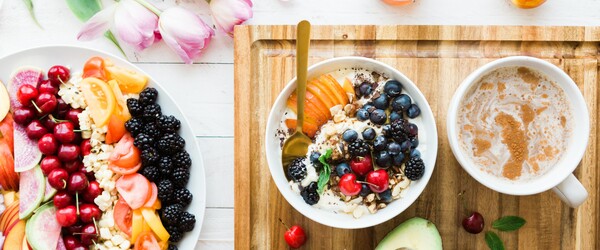
Nutritional Therapy
Nutritional Therapy
Healthy diet, better chances.
We all are aware that a good diet is essential for overall health. When trying to get pregnant it is even more important to ensure that you are getting the nutrients needed to develop healthy sperm and eggs and to support a healthy foetus. Many studies support the role of nutrition and specific nutrients in improving sperm quantity and quality, and IVF outcomes. A healthy diet can also help to keep your weight within optimal range, enhancing your chances of having a baby and can help correct hormone imbalances that may affect your ability to conceive.
In the run up to your IVF procedure, you and your partner should try to improve your lifestyle and diet. Eating a wide range of healthy foods will help get you on your way. However, there are some nutrients that are particularly important for fertility, including Omega 3, vitamin D, zinc, selenium and other antioxidant nutrients. The optimal amount of these nutrients can vary and you should avoid using high doses of single nutrients for a prolonged period without checking your levels.
Key Nutrients for fertility
Omega 3 Fatty Acids
These essential fats have a profound effect on making healthy cells and supporting hormone function. Research in the field of immunology identifies their role in helping to balance the immune system and maintain a pregnancy[i]. They are also important for women with PCOS, helping insulin metabolism[ii].
Studies have also shown their effect on male fertility, supporting higher antioxidant activity, improved sperm count, motility and morphology.[iii], [iv]
Sources of Omega 3: Oily fish such as salmon, mackerel, sardines are the best sources. Aim to eat at least 3 times per week. Other sources include pumpkin seeds, chia seeds, walnuts and ground linseeds.
Folic Acid + other B vitamins
It is well known that folic acid can prevent neural tube defects in your baby and it is essential that you get plenty both before and during pregnancy. Certain medications or medical conditions may also increase your folic acid requirements. Low levels of folate can also lead to homocysteine accumulation, which can be linked to early pregnancy loss.
Folic acid is part of the very important B-complex family of vitamins that are necessary to produce healthy genetic material in both the egg and sperm. All of the B vitamins are essential during the pre-conceptual period and if supplementing, should ideally be taken as a complex, rather than individually.
Vitamin D
Vitamin D is produced in the skin by exposure to the sun and optimum levels have been associated with improved sperm quality and quantity[v]. For women, sufficient Vitamin D has been shown to help to maintain a pregnancy and is associated with better IVF outcomes[vi]. Oily fish and eggs contain small amounts of vitamin D. However, few foods contain sufficient amounts and many people in Ireland have low levels, so supplementation is often needed. If you are supplementing Vitamin D ensure to take vitamin D3, ideally in liquid form. Excess vitamin D can be stored in the body, so it is recommended that you have your levels tested, as high levels can be harmful.
Antioxidant nutrients like vitamins A, C, E, zinc, selenium and CoQ10 help to protect delicate cells from free radical damage which can lead to damaged, poor quality eggs and sperm. Research shows improved pregnancy rates with appropriate levels[vii]. Some people have a higher requirement for antioxidants. However excessive supplementation with antioxidants may have a detrimental effect, most notably on the ability of sperm to swim rapidly and to penetrate and fertilise the egg. We recommend getting your levels checked and supplementing where required.
CoQ10
Coenzyme Q 10 is a vitamin-like substance that acts as an antioxidant, helping to protect cells from damage caused by normal everyday living and exacerbated by stress, pollution and nutrient deficiencies. A significant body of research shows it can help with sperm quality, quantity and motility[viii], and it is also believed to support egg quality, especially women over the age of 35.
Zinc
Zinc is considered one of the most important nutrients for fertility. For women, zinc is needed to ensure production of mature eggs for fertilisation, to maintain proper follicular fluid levels, for uterine health and for regulation of hormones. For men, zinc is vital for sperm production. Sufficient levels boost sperm count, motility and quality[ix].
Good food sources of zinc include oysters and other shellfish, pumpkin seeds, sesame seeds, beef, lamb, venison, yoghurt, turkey, peas.
Selenium
Selenium is another natural antioxidant which helps protect against chromosomal damage – a contributing factor to birth defects and miscarriages. It is best known for its critical role in sperm formation and motility[x]. However, selenium also plays an important role in female fertility, helping regulate thyroid and immune function, supporting the development of healthy follicles. Low levels are associated with recurrent miscarriage[xi]. It is important not to take too much selenium as high doses can be toxic.
Foods rich in selenium include wheat germ, brazil nuts (3 – 4 nuts daily is enough), mackerel, cashews, garlic, barley, wholegrain bread, oats and crab.
Vitamins C & E
Vitamin C helps protect sperm, improving sperm quality and appears to prevent sperm agglutination (clumping). In women with PCOS it can help to regulate the cycle. Vitamin C is sensitive to cooking and processing so it is best to eat at least some Vitamin C rich foods in raw form to get the most benefit. Foods sources include citrus fruits, peppers, spinach, berries, parsley, broccoli, Brussel sprouts, kiwi fruit, cauliflower, kale, red cabbage.
Vitamin E works together with Vitamin C to protect egg and sperm quality[xii] and enhance fertility. It can be found in sunflower seeds, wholegrains, avocados, tomatoes, almonds and other nuts, spinach and other green leafy vegetables. Be aware that vitamin E has blood thinning properties and should not be taken in supplement form during IVF treatment where blood thinners are being used.
Should I take supplements?
Supplements should always be supplementary to a healthy diet. At Glenville Nutrition we recommend that you avoid taking high dose single nutrients for long periods, as too much of a nutrient can be as damaging as too little. Taking a multivitamin designed for the preconception period can be helpful. Ideally have your nutrient levels tested to identify what you need.
If you do take a supplement, always check that it is suitable for use while trying to conceive as some nutrients such as vitamin A are not recommended above specific levels during this period. Always inform your doctor of any nutritional supplements you are taking and avoid taking herbs while undergoing IVF treatment unless your doctor has agreed to this.
Nutritional tests
In conjunction with medical tests that your Sims doctor may recommend, it can be very helpful to check your levels of key nutrients for fertility. This enables us to put together a nutrition and supplement programme addressing your specific requirements to help optimise your fertility.
Top tips for boosting fertility:
- A Mediterranean-style , low glycaemic index diet high in vegetables, wholegrains, fish, pulses, healthy fats and low in sugar will benefit both your waistline and your fertility
- Limit the amount of sugar and sweet foods you eat, as this contributes to weight gain and can displace healthier foods in your diet
- Avoid drinking alcohol while trying to conceive. For both partners, conception levels may reduce with more than 5 units (1/2 bottle wine) per week
- Drink plenty of water – ideally 1.5 litres daily
- get some gentle exercise. This helps to support optimal weight and reduce stress levels
Sims patients can avail of a 4 week meal plan with recipes by Glenville Nutrition to help optimise fertility. Ask your nurse or Dr for more information.
If you need additional advice on food, supplements or tests ask your Sims nurse.
References
[ii] Rafraf M et al, 2012, J Am Coll Nutr, Oct;31(5):361-8
[iii] Aksoy,Y. et al, 2006, Prostaglandins Leukotrienes and Essential Fatty Acids, Aug, 75(2), 75-79.
[iv] Safarinejad MR, 2011, Andrologia, 43, 1, 38-47
[v] Blomberg Jensen M et al, 2011, Hum Reprod, 26, 6, 1307-17
[vi] Hayes, C. E. et al, 2003, Cell Mol Biol. 49(2):277-300
[vii] Showell MG et al, 2011, Cochrane Database Syst Rev, CD007411
[viii] Safarinajad et al, Int Urol Nephrol. 2012 Jun;44(3):689-700
[ix] Wong WY, 2002, Fertility and Sterility, 77, 3, 491-8, Omu AE et al, 2008, Med Princ Pract, 17, 2, 108-16
[x] Scott R et al, 1998, British Journal of Urology, 82, 1, 76-80
[xi] Hovdenak N., Haram K., 2012: 127-32, Eur J Obstet Reprod Biol, Oct;164(2))
[xii] Greco E et al, 2005, Hum Reprod, 20(9):2590-4
